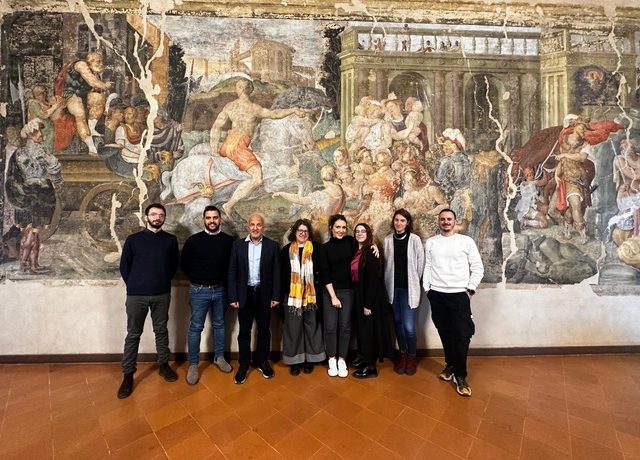A new interview in the EFPA News Magazine informs about the progress of the H-WORK project and provide insights into the role of the different partners of the consortium. EFPA is one of the 14 partners of the H-WORK project. This time, Bruna Zani interviewed Marco De Angelis, Researcher and Assistant Professor at Alma Mater Studiorum of Bologna.
1. Can you present us your team and the role of the members in the H-Work Project?
UNIBO team comprises three research groups from three departments, including the research group from the Department of Psychology, led by Professor Luca Pietrantoni, scientific coordinator of the European project, myself (Dr Marco de Angelis), Dr Davide Giusino, Dr Federico Fraboni, and just recently, Dr Lucia Volpi. The team goes along with Professor Rita Chiesa and Dr Audrey Antonio from the same Department. The research group from the Department of Education Sciences is led by Professor Dina Guglielmi and Dr Greta Mazzetti, where young researchers join the project, Dr Edoardo Pische and Dr Alessandra Albani. Also, professors Roberta Biolcati, Elena Luppi and Dr Aurora Ricci contributed to the project in its early phases. Last, the research group from the Department of Occupational Medicine, is led by Professor Francesco Violante, with Professor Roberta Bonfiglioli and dr. Giulia Paganin who recently joined us in supporting the project tasks and activities.
2. What is the role of your organisation in the H-Work Project?
As a leading partner of the Consortium, our role as the UNIBO team was multifaceted. Our first challenge was the management of the consortium, which involved both managerial and interpersonal aspects, especially during the outbreak of the pandemic. We aimed to facilitate the exchange of knowledge and expertise, promote good practices within the consortium, and effectively manage the financial aspects of the project with the support of ARIC, the University Research Area. The second challenge was conducting the project activities at the two Italian intervention sites, the Public Local Healthcare Unit (AUSL) of Bologna and La Carovana.
Our responsibility in the healthcare context was to collaborate with General Manager and Director of the Health and Safety Department, as well as senior management representatives from the three departments involved of AUSL (Emergency, General Medicine, and IRCCS, the Institute of Neurological Sciences of Bologna), to initiate all necessary procedures for testing and validation of the H-WORK toolkits, and to implement multilevel interventions for employees at various hospitals.
La Carovana is a small to medium-sized social cooperative based in Modena, Emilia-Romagna, that manages schools of various levels. The cooperative operates three kindergartens, four preschools, two primary schools, and one middle school across four sites. Dr Mazzetti and her colleagues collaborated with General Manager and the executive committee of La Carovana to complete the interventions and collect all the expected data.
3. What has your team accomplished in the project so far (results)?
We have developed and validated three H-work toolkits to promote mental health and well-being in the Italian context. Despite the challenges posed by the pandemic, we managed to engage over 250 participants in occupational health interventions. Numbers that were unexpected during that period. The other intervention team, guided by Dr Mazzetti, also made impressive progress at La Carovana.
UNIBO is also the leading partner in developing the Digital Platform. The first version of the H-work platform has recently been released thanks to the hard work of Professor Pietrantoni, Dr Federico Fraboni, Dr Davide Giusino, and Indici Opponibili, the Italian software house company that worked with us to conceptualise and build the platform. This platform is meaningful for us as it was once just an idea while working on the project proposal, and now it is accessible to all.
4. What are you currently working on, and what are the next steps?
Our focus now is on collecting final and follow-up data to understand the impact of our multilevel intervention strategies at the two intervention sites. We are also planning to test the H-WORK platform with potential end-users, gather feedback, and improve its layout and functionality. Additionally, we are preparing for upcoming events where we will present the final results at European and International conferences with our partners.
5. What are your expectations regarding the outcomes of the project, after 2 and a half years of work? Has been there a change re the initial expectations?
Throughout the project, we engaged ten intervention sites across five European countries, and all partners involved completed the expected phases. We aim to integrate the data collected so far and investigate the effects of our multilevel strategies, which we hope to share with stakeholders soon. Despite the challenges faced, we remained a tenacious consortium throughout the project.
6. What are currently the main obstacles for your work in general and in the project?
That is a good question. Regarding the challenges faced during the project, data management and personnel turnover were two significant issues. The standards for data management have risen significantly, and administrative and bureaucratic procedures can hinder progress. The change of personnel (as participants, representatives of intervention sites, critical figures in the project, or even in the commission) can also require revisiting established procedures and communication channels, making it challenging to ensure the same quality of results.
7. What has been (and still is) the impact of COVID on the work of your organisation for the project?
The pandemic is a dark chapter that revealed many weaknesses. Conducting project activities and negotiating with intervention sites while being confined at home was challenging. It took us some time to rearrange our work and expected results, causing delays. However, it allowed us to tap into resources till that moment kept aside, and we were able to conduct numerous interviews, focus groups, and interventions digitally. Although the online setting may not be ideal for some interventions (groups vs coaching), we could still talk to employees and managers about mental health and coping strategies during that period, which was an outstanding achievement.
8. What is the biggest strength of your organisation in advancing the project?
UNIBO is a large organisation that heavily encourages research and innovation projects, providing ample infrastructure and resources that support you enormously. Also, these projects attract motivated and passionate young researchers, and within the H-WORK project, the UNIBO team has achieved much due to these talented individuals. This allowed us to work with professional and competent young researchers who are always willing to support each other and work as a team.
9. How do you think your organisation and EFPA can collaborate?
Input from EFPA is highly valued because, as academics, we might need to catch up on some crucial aspects or details to be able to talk about mental health and individual and organisational well-being in the best possible way. The input and various nudges we have received so far from EFPA when we have talked about the project have been a massive help in understanding the best direction to go in. EFPA work in developing policy briefs and recommendations is inspiring. It brings together diverse knowledge and perspectives in a clear, pragmatic, and effective language where the end-users can find themselves.


